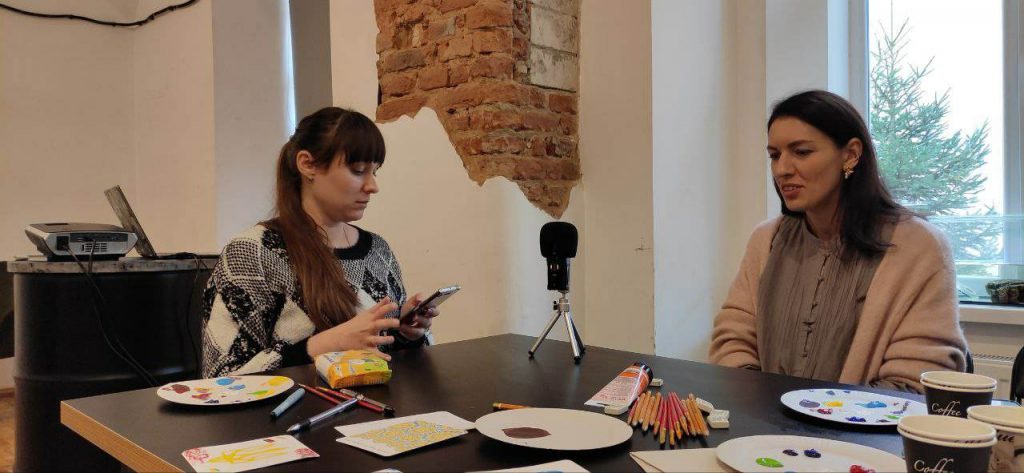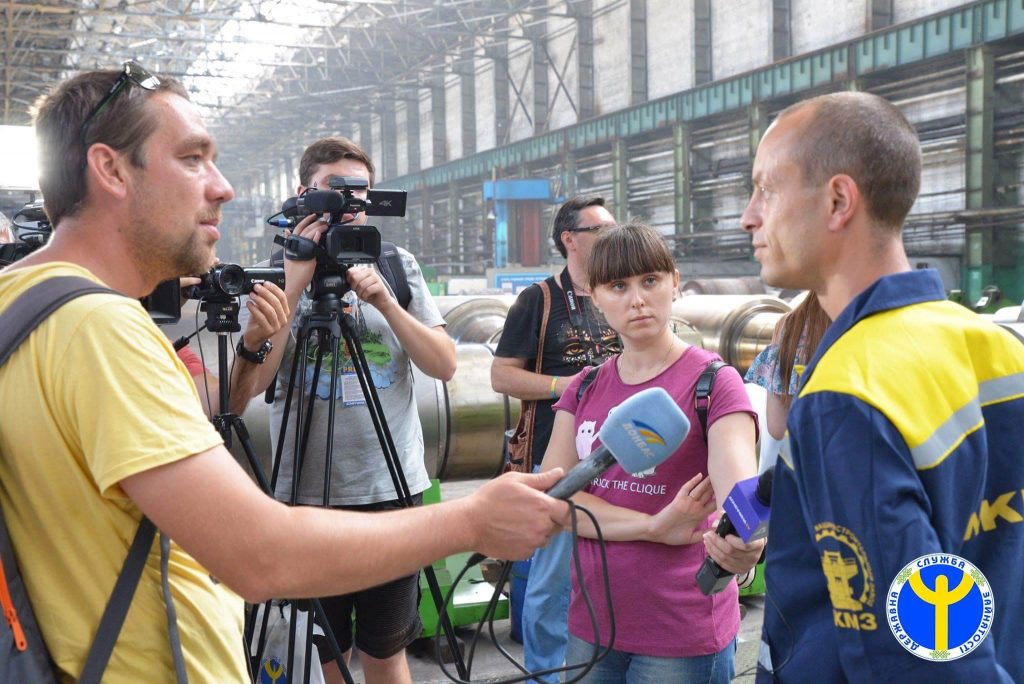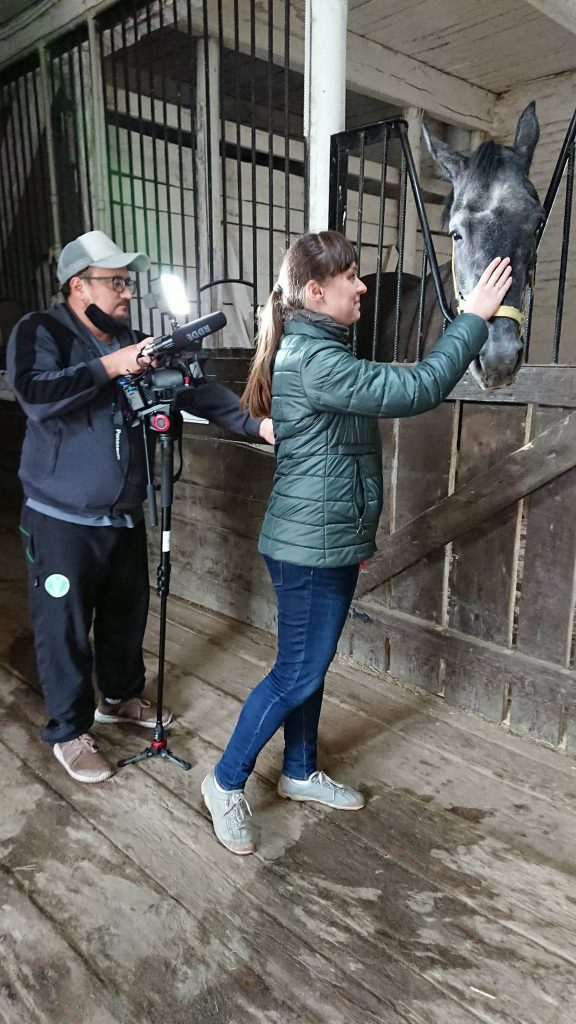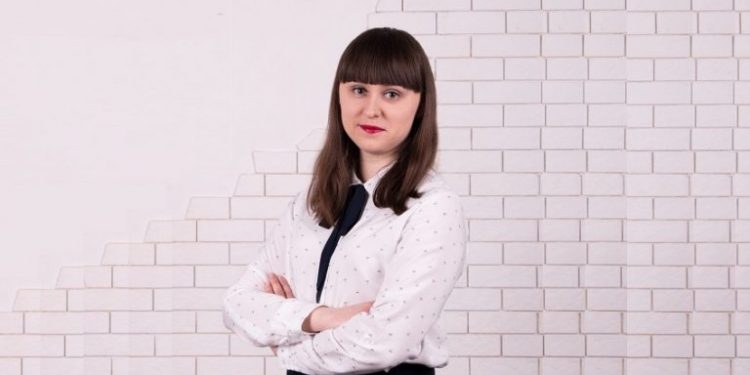Iryna Martynova and her husband, Pavlo Piskun, are forced to relocate for the second time. The first time this media family left the occupied city of Donetsk was in July 2014. In March 2022, they found themselves in Chernivtsi, leaving their home in Druzhkivka, where they lived, and the nearby city of Kramatorsk, where they worked. Iryna and Pavlo had to quickly acquire new professional skills almost on their own. This is their story, as told by Iryna to the National Union of Journalists of Ukraine (NUJU).
31-year-old Iryna Martynova has been working as a journalist for the online publication “Anti-Crisis Media Center – Kramatorsk” (acmc.ua) for three years. This public organization was established in 2015 to inform and educate the residents of communities in Donetsk and partially in Luhansk regions. Journalists focused on decentralization, state services available to local residents, how to start a business, success stories of Donetsk and Luhansk residents in their own land, and more. Authors wrote articles and produced video stories for the website.
Before the full-scale aggression by Russia, Iryna managed to visit the Udachnenska community in Donetsk, but the video story about their peaceful life was never published because it lost its relevance on February 24, 2022.
— At five in the morning, my husband and I were awakened by an explosion. From the windows of our rented apartment, which faced the field, we saw a fiery mushroom [large cloud of fire] in the distance, — recalls Martynova. — In other words, Kramatorsk was already under attack (while we lived in Druzhkivka, 18 km from Kramatorsk). We woke up in a new reality, and all the planned materials for the website were now meaningless. We had to quickly provide readers with information that could help them survive: what to do if the power, communication, and water disappear, how to behave during shelling, and so on.
The looming large-scale war became a familiar fear for Iryna and Pavlo in early 2022. They had experienced similar emotions eight years ago in Donetsk, as pro-Russian rallies, aggressive Russian neighbors, and the city’s militarization led to its occupation. While Kramatorsk had been relatively calm since 2015, the intensified shelling and Russia’s recognition of “DPR” [Donetsk People’s Republic] and “LPR” [Luhansk People’s Republic] within the administrative boundaries on February 22 made Iryna and Pavlo mentally prepare for the worst, despite their reluctance to believe it.
They stayed in Druzhkivka until mid-March when the Russians began intensively attacking Kramatorsk: two enemy bombers flew over the city.
— From the very beginning of the hostilities, considering our own experience, I understood that we would have to leave, — Martynova notes. — Otherwise, our lives would be in danger. The only question was when. Working became almost impossible: due to active combat operations near Izyum, with which we are territorially connected, the internet disappeared. Then, probably due to logistical disruptions in the region, the cost of groceries sharply increased. I remember we went to the supermarket, and a bag of rice cost 100 UAH, even though it was 40 UAH a week ago. All thoughts were about how to obtain food and how to withdraw cash from the card. There was a frenzy around ATMs everywhere.

Leaving Druzhkivka, they, along with a friend and their car, embarked on an evacuation journey. Thankfully, their evacuation was free and relatively smooth. They spent one night in a children’s hospital in Oleksandriya and another night in Khmelnytskyi on the floor of an educational institution alongside other refugees. On the third day, they arrived in Chernivtsi. They chose this city as their destination because it was one of the farthest points in Ukraine and relatively safe, even though they had no acquaintances there.
— We just kept driving and finally got here, — Iryna says.
With limited funds for accommodation and growing uncertainty about the war’s duration, they reached out to a refugee volunteer hotline. They were directed to a dormitory in an educational institution for compact living. Iryna and Pavlo continue to reside there, with minimal housing expenses for maintenance. The journalists from Donbas have no complaints about their shelter in Chernivtsi.
— The conditions here are normal for a dormitory. The room is three by four meters. There is a shared kitchen and a shared bathroom. We’re managing somehow. It’s livable, — say the displaced journalists.
Their work situation became more complicated. In peacetime, Pavlo Piskun worked as a journalist at the local TV and radio company “Region-Donbas,” and Iryna also created TV reports, collaborating with professional camera operators. However, their colleagues from Kramatorsk, who were skilled with cameras, have dispersed to different parts of Ukraine. Iryna still works remotely for the same online media outlet, acmc.ua, but she now has to shoot videos by herself. She quickly learned about video shooting and uses a smartphone since she doesn’t have a video camera.
Over the course of nine months, Iryna has gradually become a multimedia journalist.
— Our NGO mainly relies on grant funding, — Iryna explains. — For instance, during the ‘ZmInY. Skhid’ project, which concluded in November 2022, the plan was to produce video content. Thus, once we reached Chernivtsi, I began learning video shooting. I consult with our camera operators and editors remotely. They provide advice and guidance, and I also watch instructional videos.
Occasionally, when conducting interviews in a different city, Iryna would assign the task to an operator, such as in Lviv. Her colleague would propose material topics, aid in locating interviewees, and assist with logistics. Iryna and her colleague would collaborate on question lists and organizational matters, with the operator meeting the interviewee and recording the conversation.
Their publication focus has shifted. The website’s team now creates content about people from Donetsk, both those who left and those who remained in Kramatorsk and the region. They highlight their stories and resilience during the war rather than reforms.
Pavlo is learning in a similar way. He works remotely as an editor at “Donetchyna.TV,” where staff shortages and technical issues have affected operations. Some lack equipment, while others face unstable internet connections. This forces Pavlo to fulfill both journalist and editor roles, coordinating his colleagues’ work remotely. He shoots with his smartphone, and both have to act as their own camera operators.

They had to expand their technical equipment, and their fellow displaced colleagues received assistance from the National Union of Journalists of Ukraine (NUJU). Iryna brought her dictaphone [voice recorder], smartphone, and laptop from home to the new location. She purchased a smartphone stabilizer and a lavalier microphone. Unfortunately, her laptop irreparably broke down, and the repair cost was exorbitant. She sought help from the Center for Journalistic Solidarity of NUJU in Chernivtsi, submitted an application, and received a free laptop. They also received financial support from the same organization.
Mental support away from home is as crucial as technical aid. Journalists from Donetsk, now displaced, found solace among their own people, especially on Journalist Day in 2022. They celebrated this professional holiday with fellow journalists from Kramatorsk, Sloviansk, and Mariupol, who currently reside in Chernivtsi.
— Yes, I had to adapt my work to some extent, but I think it will be great for the future,” — Iryna sums up her professional transformation. — Although I sometimes miss having a camera operator – some moments are undoubtedly better captured together – I feel that I have become more mobile. When we return to Druzhkivka, I will be able to shoot some stories on my own because an operator from Kramatorsk cannot always come. It will also be easier for me to host live streams. Such a need arises from time to time. For example, we conducted a six-hour online marathon in 2021 for the 30th anniversary of Independence.

Iryna and Pavlo dream of seeing their home, but it seems that it won’t happen anytime soon. Their family, friends, and most of the residents of Druzhkivka and Kramatorsk are in evacuation. Living in these cities now is extremely challenging. Shelling is almost constant, and the Russians are destroying the city, making living conditions nearly unbearable.
Iryna has a dramatic experience with contact with occupiers. In the spring of 2014, the Donetsk Regional State TV and Radio Company, where Iryna worked, was seized by the notorious “Oplot” group along with other separatists. Pro-Ukrainian media personnel were forced to collaborate with the “new authorities.” Memories of what Iryna went through still give her chills.
— They gathered us in a hall and said, ‘You will go to Sloviansk (which was occupied at the time) and show how our boys are working,’ — she recalls indignantly. — They promised us a salary. But what is a salary worth? One of the journalists asked, ‘What if I have a different opinion about the events?’ He was told something like, ‘You cannot have a different opinion because there is the ‘correct’ one, and any ‘other’ opinion is ‘wrong.’ So, probably, we did the best we could: we stopped going to work. We applied for leave and didn’t work from April 30. Although they threatened us, saying that they would take our addresses from personnel files, go to our homes, and force us to come to the office. But no one from the occupiers ever came. And on July 23, as soon as the northern part of Donetsk was liberated, Pavlo and I left the regional center. Of course, I was afraid of a repeat occupation, and that also influenced the decision to leave Druzhkivka now. After all, occupation is worse than death. It’s scary to be a powerless puppet in someone else’s hands when they can do anything to you.
Iryna says that moving for the second time was easier because she had an approximate idea of what to expect, what things to take with her, and so on. However, the displaced journalists will only feel truly confident when Ukraine wins the war.
This series, titled Executed Free Speech, is created as part of a project Drawing Ukrainian And International Audience’s Attention To Serious Violations Of Human Rights And Crimes Against Journalists And Mass Media By The Russian Federation, which is performed by the National Union of Journalists of Ukraine, with support from the Swedish non-profit organization Civil Rights Defenders.
JOURNALISTS ARE IMPORTANT. Stories of Life and Work in Conditions of War is a cycle of materials prepared by the team of the NUJU with the support of the Swedish human rights organization Civil Rights Defenders.
#CRD

 THE NATIONAL UNION OF
JOURNALISTS OF UKRAINE
THE NATIONAL UNION OF
JOURNALISTS OF UKRAINE
















Discussion about this post